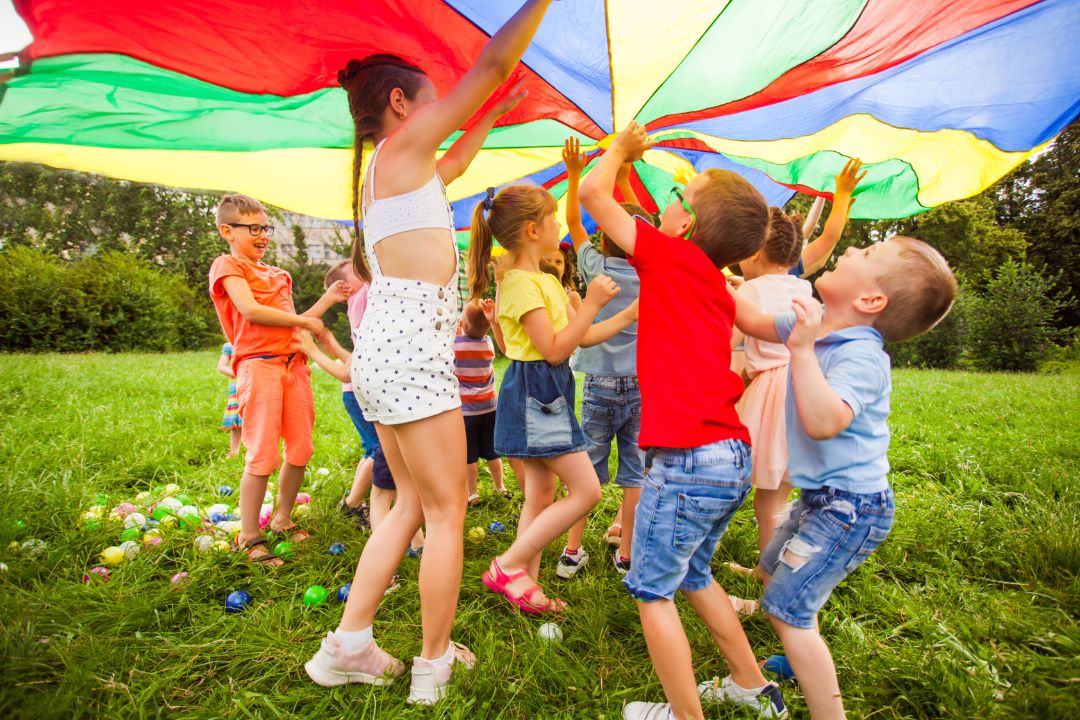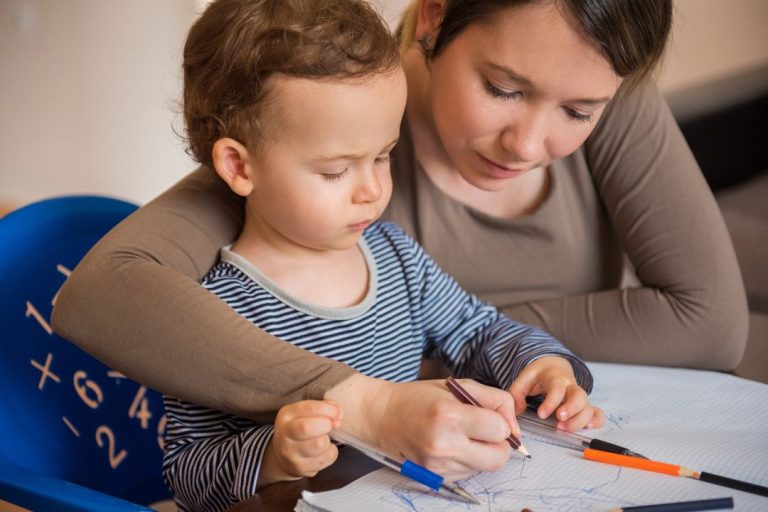Preschool Activities to Promote Social And Emotional Development

Preschool activities that promote social and emotional development include role-playing, storytelling, and group games. These activities help children learn to express emotions and understand the feelings of others.
By engaging in cooperative play and communication, preschoolers develop crucial social skills and emotional intelligence. They also learn to manage their emotions and build positive relationships with their peers. Through interactive activities, teachers can create a supportive environment that nurtures empathy and self-awareness in young children.
As educators incorporate these activities into their lesson plans, they contribute to the holistic development of preschoolers, preparing them for future social and emotional challenges. By implementing these strategies, preschools can effectively foster a nurturing and inclusive learning environment.

The Importance Of Social And Emotional Development
Social and emotional development is crucial for children as it lays the foundation for healthy relationships, effective communication, and emotional awareness. It is through social and emotional development that children learn how to manage their feelings, understand others’ emotions, and build strong connections with their peers. These skills are essential for their success in school and in life, making them an integral part of early childhood development.
Building Strong Foundations
Engaging in preschool activities geared towards promoting social and emotional development helps children build strong foundations to navigate social interactions, understand their own emotions, and develop empathy for others. Through group activities, children learn to cooperate, share, and solve conflicts, fostering a sense of belonging and inclusion within their peer groups.
Enhancing Communication Skills
Preschool activities also play a vital role in enhancing communication skills among children, allowing them to express their emotions, thoughts, and needs effectively. Engaging in group discussions, storytelling sessions, and role-playing scenarios helps children learn to listen, communicate, and build connections, setting the stage for strong communication skills in the future.
1. Games And Play
Preschool activities that focus on games and play are essential for promoting children’s social and emotional development. Engaging in fun and interactive games can help children learn how to share, take turns, and express their feelings, fostering important social skills at an early age.
These activities also encourage empathy, teamwork, and cooperation, laying a strong foundation for healthy social interactions in the future.
Preschool activities play a vital role in fostering social and emotional development in young children. Games and play provide excellent opportunities for kids to engage in interactive and collaborative experiences, honing their ability to understand and regulate their emotions, communicate effectively, and develop empathy. Here are some effective ways to incorporate social and emotional learning into preschool games and play.
Interactive Storytelling
The first step in promoting social and emotional development through games and play is interactive storytelling. Children can participate in creating and acting out their own stories, fostering imagination and emotional expression while developing communication and empathy skills.
Role-Playing Scenarios
Role-playing scenarios allow children to explore different emotions and perspectives. This activity encourages them to recognize and understand the feelings of others, promoting empathy and social awareness in a fun and engaging way.
Collaborative Building
Engaging in collaborative building activities, such as building with blocks or creating art together, not only enhances fine motor skills but also fosters teamwork, communication, and problem-solving skills. Children learn to share materials, express their opinions, and work together toward a common goal.
Incorporating these activities into the preschool curriculum can create a supportive environment that encourages social and emotional growth while allowing children to have fun and be creative.
2. Art And Creativity
Engaging in art and creativity activities can be a wonderful way to promote social and emotional development in preschoolers. Through various artistic mediums, children can express their emotions, work collaboratively, and develop essential skills. Here are some exciting art and creativity activities that can aid in the social and emotional growth of preschoolers:
Emotion Expression Through Drawing
Drawing is a powerful tool for children to communicate and express their emotions. By providing them with a safe and supportive environment, preschoolers can freely use colors, lines, and shapes to represent their feelings. Encouraging them to talk about their artwork helps in deepening their emotional understanding and allows for meaningful conversations.
Group Art Projects
Group art projects are excellent for promoting collaboration, communication, and empathy among preschoolers. By working together on a shared artistic endeavor, such as a mural or a large-scale painting, children learn to share ideas, take turns, and appreciate different perspectives. These activities also help foster a sense of belonging and community within the classroom.
Crafts For Emotional Awareness
Engaging in crafts specifically designed to enhance emotional awareness can be beneficial for preschoolers. Crafts like emotion masks or emotion journals encourage children to recognize, name, and explore their own feelings. Through these hands-on activities, they develop self-awareness, and empathy towards others, and learn healthy ways of coping with various emotions.

3. Music And Movement
Engage preschoolers in music and movement activities to bolster social and emotional skills. Encouraging interaction through dance and singing helps children develop self-expression, cooperation, and empathy. These activities also foster a sense of belonging and improve communication in early childhood development.
Dance And Emotional Expression
Dance is an incredible way to foster social and emotional development in preschoolers. When children are engaged in dance activities, they are allowed to express their emotions through movement. During dance sessions, kids can learn to identify and communicate their feelings not only with words but also with their bodies. Dancing promotes self-expression, and body awareness, and boosts self-confidence as children learn to move and groove to the rhythm. It also encourages them to explore different emotions such as happiness, sadness, and excitement, allowing them to connect with their peers on a deeper level.
Singing And Sharing
Singing is another fantastic activity that helps promote social and emotional development in preschoolers. When children sing together, they learn to share the joy of music and harmonize their voices. Singing encourages cooperation and teamwork, as kids take turns leading or joining in the chorus. It also creates a sense of belonging and unity among the group, helping children develop a sense of empathy and understanding. Singing in preschool not only strengthens social bonds but also enhances emotional well-being, as it provides a positive and uplifting experience for young learners.
Musical Games For Cooperation
Musical games are a fun and effective way to foster cooperation and social skills in preschoolers. Activities such as musical chairs or freeze dance require children to work together, follow instructions, and take turns. These games teach kids the importance of listening and respecting others’ boundaries. By participating in musical games, children learn to manage their emotions, control impulses, and work collaboratively with their peers. They develop a sense of sportsmanship and learn to celebrate both their own successes and the achievements of others. These activities are not only enjoyable but also provide valuable lessons in teamwork, cooperation, and emotional regulation.
In conclusion, incorporating music and movement into preschool activities can have remarkable benefits for social and emotional development. Dance allows children to express themselves and connect with their emotions while singing promotes sharing and a sense of belonging. Musical games encourage cooperation and teach important social skills. By incorporating these activities into the preschool curriculum, teachers can provide a holistic learning experience that nurtures emotional intelligence and fosters positive relationships among young learners.
4. Social Skills And Teamwork
Developing social skills and promoting teamwork are important aspects of a child’s preschool experience. These activities are designed to help children build relationships, learn effective communication, and work together towards a common goal. Here are three engaging activities that can help preschoolers develop their social skills and teamwork:
Role Model Activities
Role model activities provide opportunities for preschoolers to observe and learn from positive examples in their environment. By encouraging children to imitate and model the behavior of responsible and respectful individuals, they can begin to develop valuable social skills. One effective role model activity is creating a classroom “Kindness Wall.” Each week, the class can nominate students who have shown acts of kindness or helpfulness. The chosen students’ pictures can then be displayed on the wall, serving as a visual reminder for others to follow their example. This not only encourages positive behavior but also promotes a sense of community and empathy among the children.
Problem-solving Games
Problem-solving games are excellent for teaching preschoolers how to work collaboratively and think critically. An engaging activity is the “Obstacle Course Challenge.” Divide the children into small groups and set up an obstacle course using different objects and materials. The groups must work together, strategize, and find creative ways to navigate the course. This game not only promotes teamwork but also encourages communication, problem-solving, and decision-making skills. By working together to overcome challenges, children learn the importance of cooperation and develop their social and emotional abilities.
Cooperative Sports
Introducing cooperative sports to preschoolers is an excellent way to teach them the value of teamwork and positive competition. One popular activity is “Balloon Volleyball.” Set up a net using a rope or string and create teams. Instead of using a ball, children use balloons to volley back and forth. This activity promotes teamwork, as the children must work together to keep the balloon airborne. Additionally, it encourages social interaction and communication skills as they must coordinate their movements and communicate with their teammates. Cooperative sports like this help children develop a sense of camaraderie, cooperation, and respect for their peers.
These activities provide valuable opportunities for preschoolers to establish strong social skills and teamwork abilities. By engaging in role model activities, problem-solving games, and cooperative sports, children can learn important life skills that will benefit them in their future relationships and interactions.

5. Mindfulness And Emotional Regulation
Mindfulness and emotional regulation activities are essential for preschoolers as they help to develop self-awareness, empathy, and emotional control. Encouraging young children to practice mindfulness from an early age can greatly benefit their social and emotional development. Here are some activities that you can introduce to promote mindfulness and emotional regulation:
Breathing Exercises
Breathing exercises are simple yet effective practices that can help preschoolers calm their minds and manage their emotions. Teaching children how to take deep breaths can empower them with a powerful tool to handle stress and regulate their emotions.
- Start by teaching the children to sit comfortably with their backs straight and close their eyes.
- Explain the concept of deep breathing and encourage them to take slow, deep breaths in through their nose and out through their mouth.
- Guide them to notice how their belly rises and falls with each breath, bringing their full attention to the present moment.
- Practice different breathing techniques, such as belly breathing, square breathing, or finger breathing, to make it engaging and fun.
Yoga For Kids
Yoga is a wonderful activity that combines mindful movements, breath awareness, and relaxation. Introducing yoga to preschoolers not only helps them develop strength, balance, and flexibility but also cultivates self-regulation and emotional resilience.
- Start with simple yoga poses like tree pose, cat-cow pose, and child’s pose.
- Encourage children to focus on their breath while moving through the poses, guiding them to notice how their bodies feel in each position.
- Incorporate storytelling and animal themes to make the yoga session more engaging and interactive.
- End the yoga session with a short guided relaxation exercise, allowing the children to rest and connect with their inner calm.
Emotion Awareness Activities
Emotion awareness activities help preschoolers recognize and understand their own emotions as well as the emotions of others. These activities promote empathy, enhance communication skills, and foster positive relationships.
| Activity | Description |
|---|---|
| Emotion Charades | Invite children to act out different emotions while others guess which emotion they are portraying. Encourage discussions about the physical and facial cues associated with each emotion. |
| Emotion Cards | Create a set of emotion cards with pictures depicting various emotions. Ask the children to identify each emotion and share a personal experience related to that emotion. |
| Feelings Check-In | Start each day or session with a feelings check-in, where children can express how they are feeling that day. This activity encourages emotional expression and fosters a supportive classroom environment. |
By incorporating mindfulness and emotional regulation activities into preschool routines, educators can provide a strong foundation for social and emotional development. These practices empower children with valuable skills that they can carry throughout their lives.
Frequently Asked Questions On Preschool Activities To Promote Social And Emotional Development
What Are Some Fun Activities For Preschoolers To Promote Social And Emotional Development?
Engaging in cooperative games, role-playing activities, and storytelling can help preschoolers develop empathy, communication skills, and self-awareness. Activities like sharing circles, art projects, and group problem-solving exercises also promote social and emotional growth.
How Can I Teach Emotional Intelligence To My Preschooler?
Encourage emotional expression by helping your preschooler identify and label their emotions. Engage in discussions about emotions during storytime and practice problem-solving skills. Model empathy and kindness, and provide opportunities for your child to develop emotional awareness through play and social interactions.
What Role Does Playtime Have In Promoting Social And Emotional Development In Preschoolers?
Playtime is crucial for preschoolers to develop social and emotional skills. Through play, they learn to take turns, negotiate, share, and solve problems. It allows them to express their emotions, develop empathy, and practice communication skills, all of which are vital for healthy social and emotional growth.
Conclusion
Promoting social and emotional development in preschoolers is crucial for their overall growth. These activities not only engage children in meaningful interactions but also help them develop empathy, communication skills, and self-awareness. By incorporating activities such as storytelling, role-playing, and art, educators can create an environment that fosters emotional intelligence.
As children navigate through different social situations, they learn valuable life skills that will benefit them in the years to come. Start implementing these activities today and watch your little ones thrive!

Emma combines her teaching experience with her writing skills to produce engaging and informative content. She covers a range of topics, from classroom management to innovative teaching techniques.






